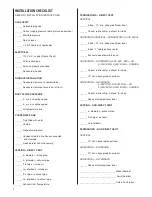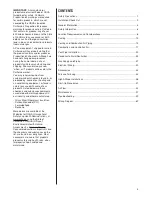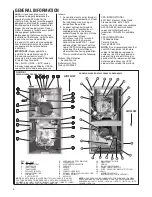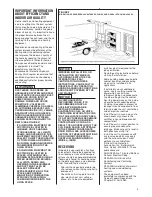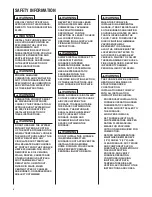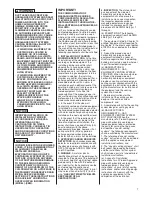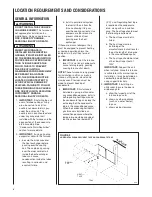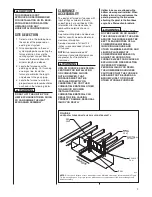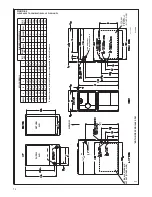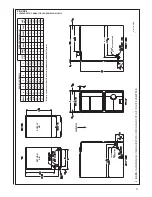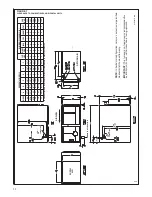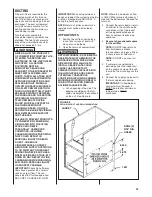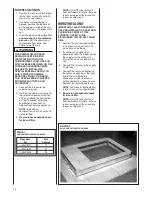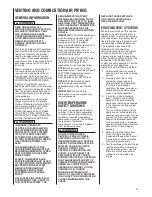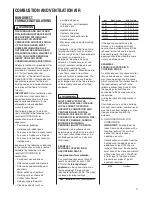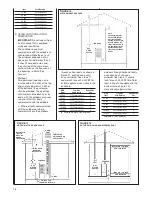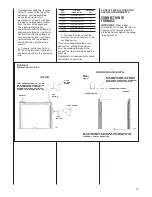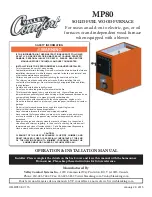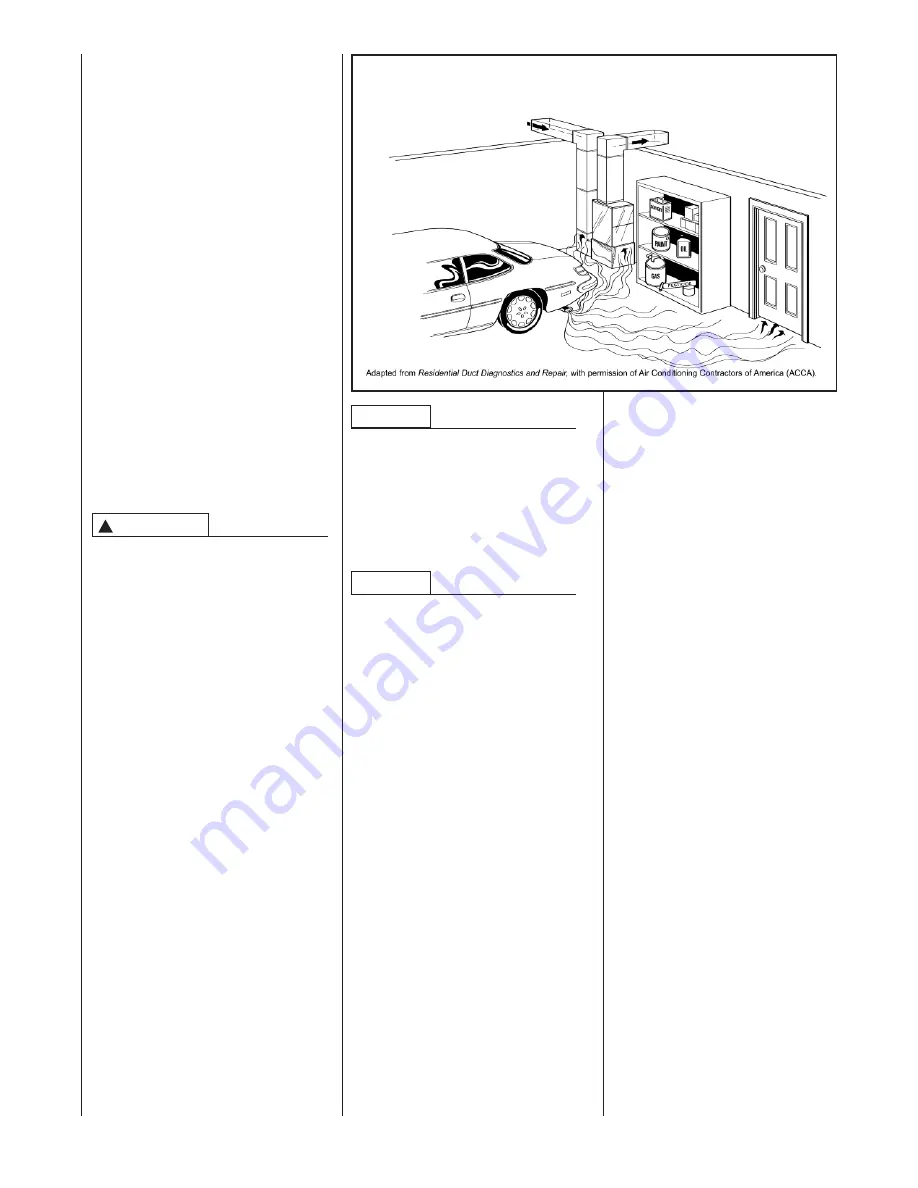
5
IMPROPER INSTALLATION, OR
INSTALLATION NOT MADE IN
ACCORDANCE WITH THE CSA
INTERNATIONAL (CSA)
CERTIFICATION OR THESE
INSTRUCTIONS, CAN RESULT IN
UNSATISFACTORY OPERATION
AND/OR DANGEROUS CONDI-TIONS
AND ARE NOT COVERED BY THE
UNIT WARRANTY.
IN COMPLIANCE WITH
RECOGNIZED CODES, IT IS
RECOMMENDED THAT AN
AUXILIARY DRAIN PAN BE
INSTALLED UNDER ALL
EVAPORATOR COILS OR UNITS
CONTAINING EVAPORATOR COILS
THAT ARE LOCATED IN ANY AREA
OF A STRUCTURE WHERE DAMAGE
TO THE BUILDING OR BUILDING
CONTENTS MAY OCCUR AS A
RESULT OF AN OVERFLOW OF THE
COIL DRAIN PAN OR A STOPPAGE
IN THE PRIMARY CONDENSATE
DRAIN PIPING. SEE ACCESSORIES
SECTION OF THESE INSTRUCTIONS
FOR AUXILIARY HORIZONTAL
OVERFLOW PAN INFORMATION
(MODEL (-)XBM).
RECEIVING
Immediately upon receipt, all cartons
and contents should be inspected for
transit damage. Units with damaged
cartons should be opened immediately.
If damage is found, it should be noted
on the delivery papers, and a damage
claim filed with the last carrier.
• After unit has been delivered to job
site, remove carton taking care not to
damage unit.
• Check the unit rating plate for unit
size, electric heat, coil, voltage,
phase, etc. to be sure equipment
NOTICE
IMPORTANT INFORMATION
ABOUT EFFICIENCY AND
INDOOR AIR QUALITY
Central cooling and heating equipment
is only as efficient as the duct system
that carries the cooled or heated air. To
maintain efficiency, comfort and good
indoor air quality, it is important to have
the proper balance between the air
being supplied to each room and the air
returning to the cooling and heating
equipment.
Proper balance and sealing of the duct
system improves the efficiency of the
heating and air conditioning system
and improves the indoor air quality of
the home by reducing the amount of
airborne pollutants that enter homes
from spaces where the ductwork and /
or equipment is located. The
manufacturer and the U.S.
Environmental Protection Agency’s
Energy Star Program recommend that
central duct systems be checked by a
qualified contractor for proper balance
and sealing.
DUCT LEAKS CAN CREATE AN
UNBALANCED SYSTEM AND DRAW
POLLUTANTS SUCH AS DIRT, DUST,
FUMES AND ODORS INTO THE
HOME CAUSING PROPERTY
DAMAGE. FUMES AND ODORS
FROM TOXIC, VOLATILE OR
FLAMMABLE CHEMICALS, AS WELL
AS AUTOMOBILE EXHAUST AND
CARBON MONOXIDE (CO), CAN BE
DRAWN INTO THE LIVING SPACE
THROUGH LEAKING DUCTS AND
UNBALANCED DUCT SYSTEMS
CAUSING PERSONAL INJURY OR
DEATH (SEE FIGURE 2).
• IF AIR-MOVING EQUIPMENT OR
DUCTWORK IS LOCATED IN
GARAGES OR OFF-GARAGE
STORAGE AREAS - ALL JOINTS,
SEAMS, AND OPENINGS IN THE
EQUIPMENT AND DUCT MUST BE
SEALED TO LIMIT THE MIGRATION
OF TOXIC FUMES AND ODORS
INCLUDING CARBON MONOXIDE
FROM MIGRATING INTO THE
LIVING SPACE.
• IF AIR-MOVING EQUIPMENT OR
DUCTWORK IS LOCATED IN
SPACES CONTAINING FUEL
BURNING APPLIANCES SUCH AS
WATER HEATERS OR BOILERS -
ALL JOINTS, SEAMS, AND
OPENINGS IN THE EQUIPMENT
AND DUCT MUST ALSO BE
SEALED TO PREVENT
DEPRESSURIZATION OF THE
SPACE AND POSSIBLE
MIGRATION OF COMBUSTION
BYPRODUCTS INCLUDING
CARBON MONOXIDE INTO THE
LIVING SPACE.
NOTICE
WARNING
!
matches what is required for the
job specification.
• Read the entire instructions before
starting the installation.
• Some building codes require extra
cabinet insulation and gasketing
when unit is installed in attic
applications.
• If installed in an unconditioned
space, apply caulking around the
power wires, control wires,
refrigerant tubing and condensate
line where they enter the cabinet.
Seal the power wires on the inside
where they exit conduit opening.
Caulking is required to prevent air
leakage into and condensate from
forming inside the unit, control box,
and on electrical controls.
• Install the unit in such a way as to
allow necessary access to the
coil/filter rack and blower/control
compartment.
• Install the unit in a level position to
ensure proper condensate
drainage. Make sure unit is level in
both directions within 1/8”.
• Install the unit in accordance with
any local code which may apply
and the national codes. Latest
editions are available from:
“National Fire Protection
Association, Inc., Batterymarch
Park, Quincy, MA 02269.” These
publications are:
• ANSI/NFPA No. 70-(Latest Edition)
National Electrical Code.
• NFPA90A Installation of Air
Conditioning and Ventilating
Systems.
• NFPA90B Installation of warm air
heating and air conditioning
systems.
• The equipment has been
evaluated in accordance with the
Code of Federal Regulations,
Chapter XX, Part 3280.
FIGURE 2
MIGRATION OF DANGEROUS SUBSTANCES, FUMES, AND ODORS INTO LIVING SPACES
Summary of Contents for RGRK SERIES
Page 41: ...41 FIGURE 39 TYPICAL MANIFOLD PRESSURE READING...
Page 45: ...45 FIGURE 43 UT Electronic Controls 1095 201 IFC TWINNING CONNECTION SINGLE STAGE OPERATION...
Page 60: ...60 FIGURE 53 TROUBLESHOOTING CHART or IFC not properly grounded Go To Next Page...
Page 61: ...61 FIGURE 53 TROUBLESHOOTING CHART CONTINUED...
Page 62: ...62 FIGURE 54 WIRING DIAGRAM...
Page 63: ...63...
Page 64: ...64 CM 0510...


